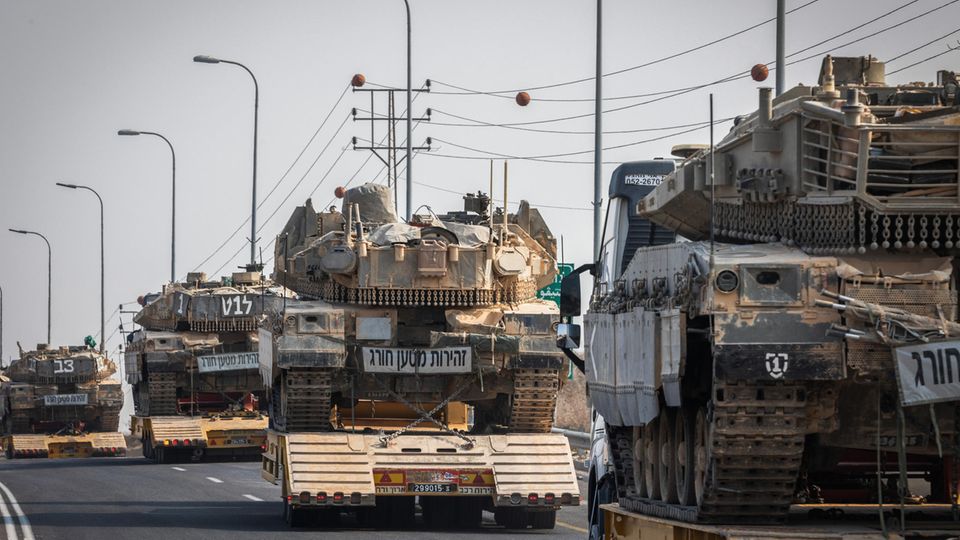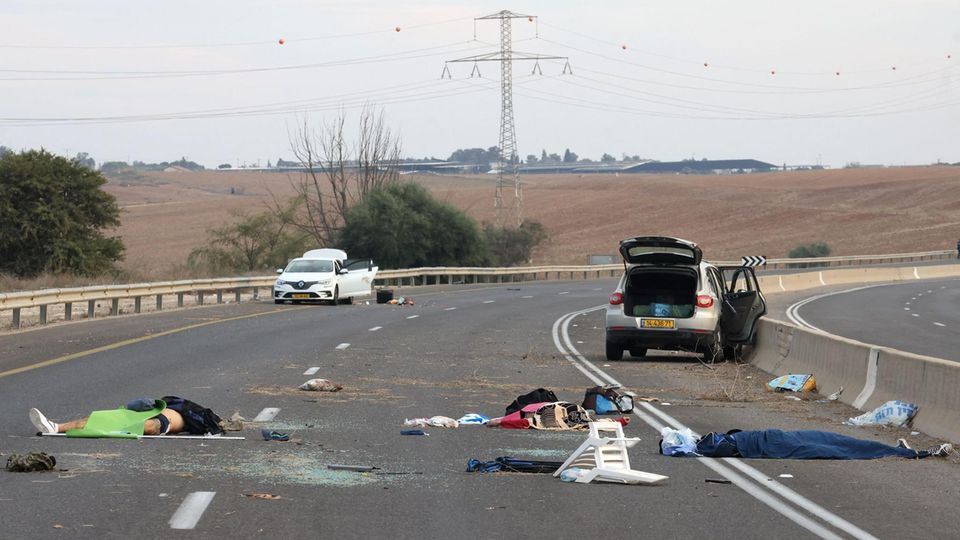Zeruya Shalev is one of Israel’s most successful writers. She had repeatedly warned that Prime Minister Benjamin Netanyahu’s policies were weakening the country even against its enemies. This is how she experiences the days of terror.
We reach Zeruya Shalev at home in Haifa on Monday, two days after Hamas began its attacks on Israel. She had had to cancel a conversation the evening before because of a high fever – Corona, she says, the second time: “But that doesn’t matter now.” Things have been quiet in Haifa so far, she says.
Shortly before our conversation, her daughter reported that a friend had died in the attacks in the south of the country, and her husband and two children were also killed. “It’s so terrible, I don’t even know where to start,” says the author of novels like “Love Life” (2000) or “Fate” (2021), she sounds almost apologetic, “I don’t know if I to get my thoughts organized…”
Ms. Shalev, thank you very much for taking the time despite everything. The world is shocked by the attacks, by the deaths, by the cruel hostage-taking. How are you experiencing the atmosphere right now?
You know, as a writer, I’m very attached to words. But at this moment I’m at a loss for words. There are no letters to describe these feelings. The endless pain. The fury. The fear. It’s such a horror, it’s beyond imagination. I never thought such a disaster could happen.
Did the attacks come out of nowhere for you?
Yes, of couse. There was no warning. No intelligence information. Nothing. It took us completely by surprise. So many dead and injured. So many hostages. This all happened because they were able to surprise us with their attack.
I’m asking this because you’re talking to him star said in April: “Netanyahu is waging a private war with the state. But this can very quickly turn into a war across the Middle East.” That was six months ago.
The specific attack came as a surprise. But I – like many others – have said again and again since Benjamin Netanyahu established his illiberal governing coalition: “This will end in chaos.” It became apparent.
There have been demonstrations against Netanyahu and his right-wing religious coalition for years. Most recently, especially against the reform, with which, critics see, he wants to undermine the independence of the judiciary. The rule of law. They were involved in the protests from the beginning. What do you accuse him of?
Netanyahu has used Israel for his own interests. The police and judiciary were investigating him for corruption – so he started attacking them. Netanyahu has been prime minister many times. He should have known better. But he was willing to sacrifice the state and security of Israel. At all the demonstrations, people warned: “The country will be weakened by this crisis.” Israel is not Switzerland. Israel is a country threatened by many forces. Iran, Hamas, Hezbollah. In such a situation, the state cannot be weakened. But Netanyahu played his games. Now we see the consequences.
What exactly do you mean? What makes Netanyahu’s politics so dangerous?
He has divided society – and not only that. He has sown hatred among different groups. He has attacked the country’s most important institutions, the police, the judiciary and sometimes even the army, for personal reasons. In the most important places, everything fell into two camps. There were people in the army, fighter pilots, who said they would no longer serve if Netanyahu and his coalition continued. But he didn’t stop. The country became weak and vulnerable.
And the enemies benefit from it?
It is nothing new that Israel is surrounded by enemies. The question is always: Do we give them the opportunity to attack us or not. We gave them an opportunity. They couldn’t resist. From her perspective, it was perfect timing.
What is your biggest fear about how the situation might develop?
We are all afraid that it will start in the north too. Hezbollah is much stronger than Hamas.
Do you think the attacks are helping to overcome the deep divisions in society?
Maybe for the duration of the war. I hope that the people who supported the government will now open their eyes and see where this government has taken us. I hope that together we can override these rulers and find our way back to a liberal, moderate course. To politicians who care about the state and not their own interests. But it is too early to say anything about the consequences. It’s just the beginning…
The beginning of what? What are you afraid of?
I don’t know it. The fighting in the south will continue. The question is whether we will have a second front in the north. The question is also whether and how severely we are attacked internally by terrorists. The threats are so diverse, I don’t even want to imagine it. There are so many people affected. So many hostages.
Netanyahu said years ago about a confrontation with Iran: “Better now than later.” Did he add fuel to the fire with such statements?
I do not think so. He often spoke in martial terms, but all the while Iran became stronger and stronger. It was similar with Hamas. “With all severity against Hamas” – that was one of Netanyahu’s slogans. He thought that there could be logic in dealing with Hamas. But Hamas is not concerned with the well-being of the Palestinians; there is no logic behind their actions. Hamas is only interested in destroying the Israeli state. That’s no secret.
So the self-proclaimed hardliner Netanyahu was too soft in his dealings with Hamas?
I think he overestimated himself. He believed he could deal with Hamas’ violence by simply living quietly, side by side. According to the motto: Every now and then they fire a few rockets, we launch a counterattack – and it stays that way. This is how he wanted to manage the conflict. This concept has now proven to be a complete failure. Hamas must have been planning its attacks together with Iran for months.
What exactly do you think was Netanyahu’s mistake in dealing with the Palestinians?
Instead of reaching out to people who appear more moderate, he focused on Hamas. This has strengthened Hamas. He didn’t negotiate with them, but it was like an unspoken agreement, while he barely had any contact with the other Palestinian authorities.
You always hear analysts saying: “You have to liberate the Palestinian areas from Hamas; only then will peace and negotiations be possible.” What do you think about that?
Hard to say. We do not know how strong the support for Hamas is among the Palestinians and how many suffer at its hands. What is certain is that we must try to come into contact with all moderate forces. We must agree that Hamas is a terrorist organization and completely exclude them from discussions. The Palestinians would also benefit from this. However, I don’t know how this is practically possible. Now that Israel has withdrawn from Gaza, Hamas is the only source of money. They get a lot of money to build up the region. But they only use it for weapons. You don’t use the money for life. They use it for death. This is the great tragedy of the Israelis and the Palestinians.
Is the international community not supporting enough? Are we too indifferent in the fight against Islamist terror, which threatens not only Israel but the entire region?
Islamist terrorism is not a problem limited to Israel. There were the attacks in Paris, there was September 11th, to name just a few examples. It doesn’t matter what the organization behind the attacks calls itself – fundamentalist Islamist terror is a threat to all Western democracies. That’s why I think we all have to stand together.
Netanyahu, you said, has divided Israeli society. Did he weaken her too? How do you experience civil society right now?
During the protests against the government, we saw how strong the population can be. Yes, Israelis live in fear and the government has taken a manipulative course. But I’m already hearing stories that tell of the other, the courageous Israel. From former soldiers who went straight away, they saved so many people. The people are strong, they have values, they comfort and they support each other. They deserve better than this government.
How do you notice this strength?
I notice it in little things. We organize ourselves via WhatsApp groups, everyone mobilizes help wherever possible, reservists join the defense of the country. I myself will bake a lot of cakes for the soldiers. This is only a tiny contribution, but everyone is doing what they can. You invite people from the south, you form networks, it all works naturally. The solidarity and spirit of resistance in Israel are enormous.
You live in Haifa. A city that you have often described as “idyllic” because Israelis – Arab and non-Arab – live side by side. What is the situation in the neighborhood right now?
I also experience the Arab Israelis as showing great solidarity. Everyone is shocked and tries to help. I really hope it stays that way.
In 2004 you barely survived a bomb attack. Nevertheless, you have repeatedly said: “Israel is my country and I will never leave it.”
That’s how it is now. Friends from Berlin invited us to their house as soon as it started. I am very grateful for that. But I want to be here. I want to be involved in what is happening in my country. This is my place. This may be surprising, but I have many Israeli friends who are abroad and who are now trying to get back as quickly as possible. They want to fight. That is the attitude right now.
What is your hope? How do you look to the future?
Hope? This is difficult right now. Sometimes disasters can make things seem clearer. You can then see better: who is an enemy, who is a partner? Every person knows that the lives of our children and families are more important than anything else. But sometimes it seems to me as if there is a curse over everything that keeps bringing extremists to power. Maybe a restart is possible. Perhaps we all need to work harder to bring together the moderate forces against terror in the Middle East. I admit, that sounds like an illusion. Especially today.
What else are you going to do today?
I’ll call my daughter back. I’ll bring water, food and some books to our safe room. Now it’s about surviving this war.



